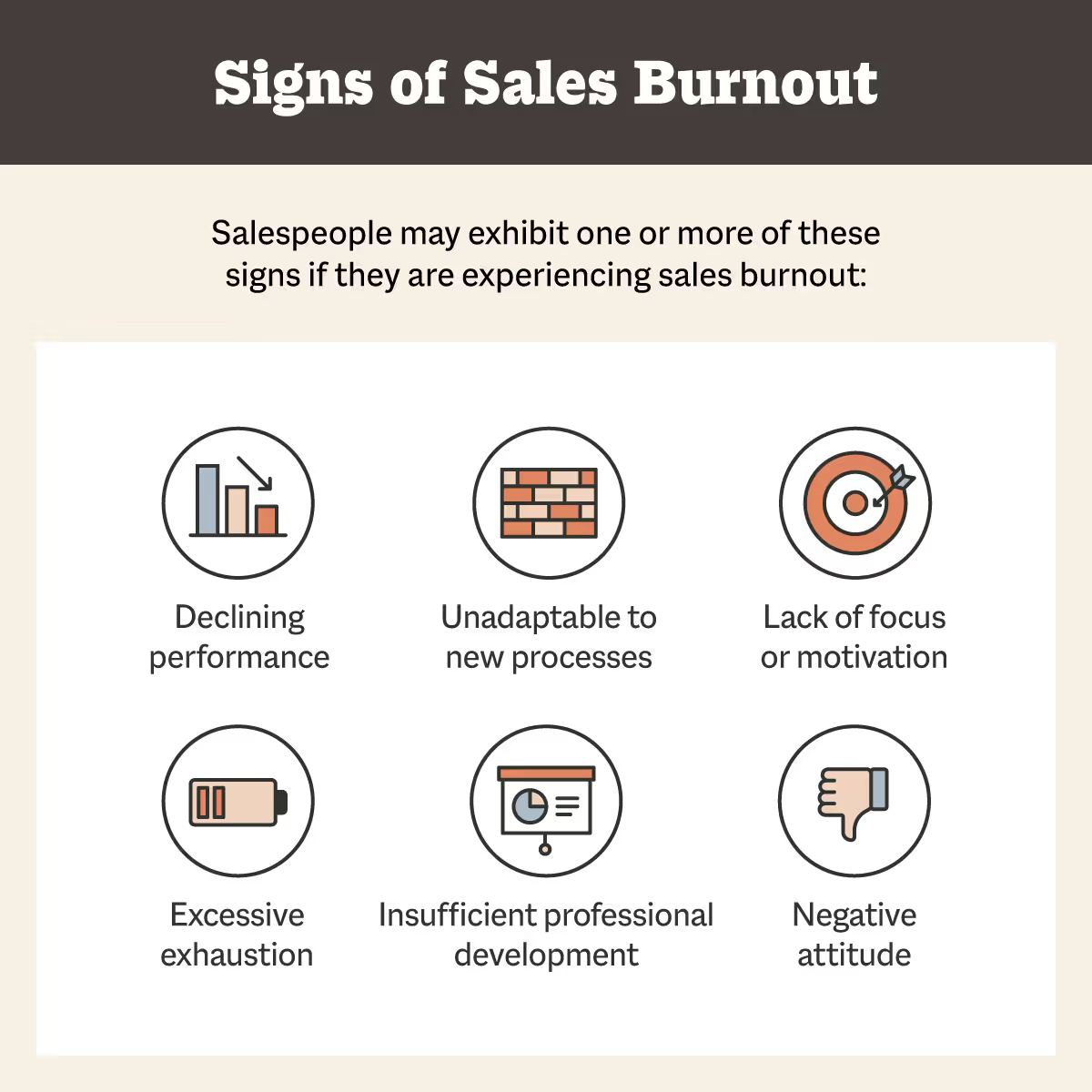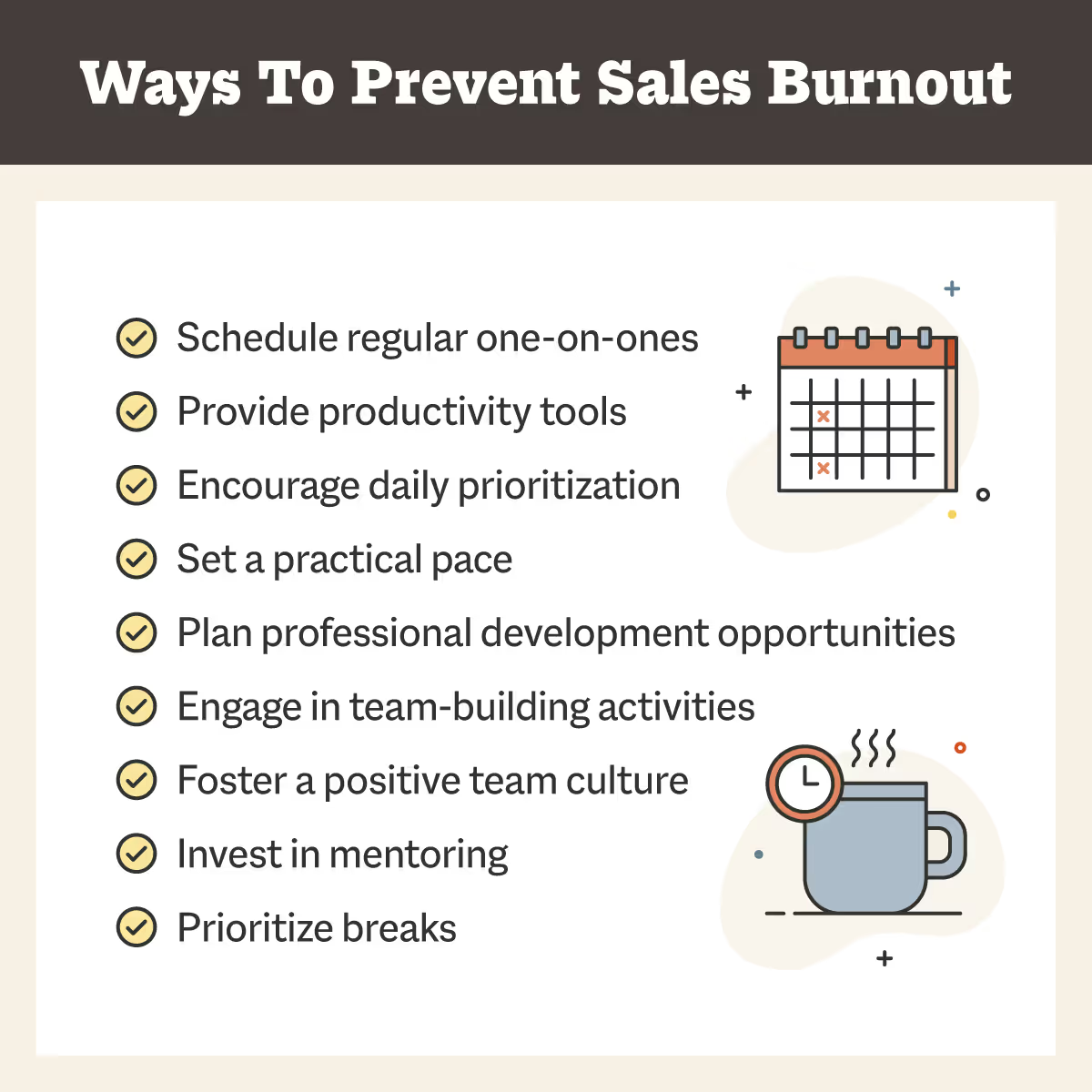Sales Burnout: Preventing and Recovering From the Burnout Outbreak
Sales Burnout: Preventing and Recovering From the Burnout Outbreak

Sales — and salespeople — are vital to the success of any business. Before they even make a sale, they develop and support customer relationships and promote a business's products or services. When your sales team is succeeding, your business is succeeding.
As a result of their demanding positions handling difficult clients and complex business deals, nearly 90% of salespeople eventually experience sales burnout. When this happens, your sales teams are no longer meeting quotas and closing important deals. Instead, their morale declines and your business suffers.
Virtual receptionists can handle calls, texts, and support sales efforts during your teams' on- and off-hours, but you can also take intentional steps to prevent and avoid sales burnout by following these ten recommendations.
Table of Contents:
- What is sales burnout?
- 8 causes of sales burnout
- Signs of burnout in sales
- 10 ways to prevent and avoid sales burnout
- Burnout recovery
- Avoid sales burnout in your team with help from Smith.ai
What is sales burnout?
Sales burnout refers to the mental, emotional, and sometimes physical distress members of a sales team can experience. This state of distress is caused by frequent and continued exposure to different stressors.
Salespeople are often asked to contact demanding clients, stay on top of complex projects and proposals, and handle rejection. Burnout and poor mental health in the workplace can cause excess stress and frustration, which can lead to substandard performance and workplace turnover.
What can cause sales burnout?
While burnout is one of the top reasons salespeople leave their jobs, it doesn’t happen without cause. Sales burnout can occur because of:
- Absence of managerial support: Team members who lack support from management may feel they are alone when solving problems, receiving rejections, and contacting clients.
- A harmful sales environment: A lack of transparency, communication, and feedback from managers and coworkers can cause sales burnout.
- Lack of tools or resources: Inefficient processes due to a lack of tools and resources can cause salespeople to experience stress and frustration.
- Lack of recognition: Failing to recognize a salesperson’s successes can discourage their efforts and decrease their energy.
- Unclear goals and expectations: If clear goals or expectations aren’t communicated, a salesperson may feel ineffective and unnecessary.
- Insufficient mentoring: Your salespeople should be assigned a mentor who can give advice, listen to frustrations, and help solve problems.
- Inconsistent feedback: Sales members need frequent, constructive feedback to make adjustments to their schedules and perform consistently.
- Unmanageable workloads: Too many meetings, early starts, and staying late can cause feelings of sales burnout.
Signs of burnout in sales
Sales burnout is usually a state of mental or emotional distress, but there are some noticeable signs of burnout both managers and employees should be aware of.

Declining performance
If you notice a team member’s performance metrics are declining, this could be a sign of sales burnout. Consistently performing under expectations may not necessarily warrant a discussion about sales burnout, but a salesperson who usually performs at expected levels or above and whose numbers begin to fall may be experiencing undue stress or frustration.
Lack of focus or motivation
If you notice a salesperson’s energy and enthusiasm are not up to par, they may be experiencing sales burnout. Consider offering your team member a few possible solutions, such as:
- Time off: This encourages them to recharge without feeling obligated to answer phone calls and emails.
- A performance plan: Update their expectations, set up check-in meetings, and create new benchmarks to help them feel supported.
- Role changes: Allow team members to consider new positions or role responsibilities with your support.
Negative attitude
Sales teams may vent about frustrating phone calls and difficult clients, but there shouldn’t be a home for persistent, never-ending negativity. If you see a salesperson growing increasingly negative toward all things sales, it may be time to have a conversation with them about employee burnout.
Unadaptable to new processes
Sales teams need to be dynamic and adaptable to new circumstances, software, and processes. Burnout may cause team members to refuse to change their mindset or learn new work tools or processes. To combat this, consider:
- Requiring change: Make tools, processes, or team activities a requirement of their job position.
- Providing training: Offer in-depth training on new tools or processes so team members feel supported during times of change.
- Setting up benchmarks: These will measure your team’s learning pace and set reasonable expectations for implementation.
- Rewarding behavior: Provide positive feedback and rewards for behavioral or process improvements.
Insufficient professional development
Sales technology and techniques are constantly changing. A salesperson experiencing burnout may begin to ignore these changes, be unable to keep up with them, or refuse to invest in professional development courses and readings.
Excessive exhaustion
Emotional and mental fatigue can lead to noticeable physical exhaustion. If you have a salesperson who is unable to sleep, complains of headaches, or experiences excessive daytime sleepiness, they may be experiencing physical symptoms of burnout.
10 Ways to prevent sales burnout
Avoiding stress in the workplace is difficult, but you can help your team avoid sales burnout by implementing these ten recommendations.
1. Schedule regular one-on-one coaching meetings
Establishing close, trusting relationships with your team members is one way to avoid sales burnout. Regular coaching meetings allow salespeople to voice frustrations, ask questions, and receive advice about current clients and projects. Managers and coaches should use these meetings to listen to employees and brainstorm solutions to their concerns.
2. Provide productivity tools
Closing deals depends on more than just smooth-talking salespeople or convincing emails — it also relies on sales enablement. To prepare your team to work effectively and efficiently, provide them with productivity tools that are updated and easy to use. Plus, tool training can help relieve some of the everyday stress and confusion felt by your team members.
3. Encourage daily prioritization
Salespeople working with unique clients, projects, and coworkers each have different daily priorities. Encourage your team to identify these priorities each day and structure their schedules accordingly. Their most productive times of day should be used to complete high-priority tasks.
4. Set a practical pace
Many salespeople reach a state of sales burnout simply because they are expected to consistently work at a neck-breaking pace. Because a practical work pace can be the difference between a burnt-out salesperson and a successful one, consider what you are asking your employees to accomplish and how much time you are giving them to succeed.
5. Outsource from professionals
If your team is experiencing overwhelming workloads, it might be time to outsource. Professional resources — like Smith.ai — are designed to help organizations succeed by assuming responsibility for some tasks or roles. For example, we can provide sales follow-ups to qualified leads and answer calls around the clock.
6. Plan professional development opportunities
With changing technology and sales strategies, it’s important to encourage and plan professional development opportunities for your employees. Invest in external experts and attend training sessions with your team regularly. You can set up workshops, attend online webinars and conferences, or plan brainstorming sessions where your employees can contribute development ideas.
7. Engage in team-building activities
Your employees may begin to feel sales burnout if they feel disconnected from the other salespeople on their team. Whether your team meets remotely or in person, have your team members engage in team-building activities to grow camaraderie, boost performance, and establish team connections and communication.
8. Foster a positive team culture
The mental and physical well-being of your employees can be directly tied to your team’s culture. Consider encouraging your team members to listen to music as they work, take mental health days, enjoy a mid-day gym class, or spend their evenings disconnected from work. It’s also important to prioritize regular feedback and rewards when cultivating a positive team culture.
9. Invest in mentoring
Whether you take charge of employee mentoring yourself or assign individual mentors to your team members, it’s important to prioritize employee investment. Mentors can be helpful sounding boards with years of professional experience, which allow your salespeople to grow in their positions while working with other like-minded individuals.
10. Prioritize breaks
If you want to encourage employee productivity and avoid sales burnout, prioritize regular work breaks. Breaks away from scheduled activities or stressful projects can actually increase accuracy, improve workflow, and inspire new ideas. Simply prioritizing 10 to 15 minutes away from a computer screen every few hours can prevent burnout and support mental health.

Burnout recovery
If your company or team has experienced sales burnout, there are ways to recover. Restructuring your team's priorities and expectations can be a great place to start, but there are several approaches to burnout recovery. No matter what, make sure your recovery considers:
- Structure: Adjust structures and expectations according to each team member’s abilities. Keep their strengths top of mind.
- Communication: Encourage workplace communication. If your team members are experiencing sales burnout, they should feel comfortable discussing their frustrations.
- Expectations: Regularly discuss and revisit employee expectations. These can be adjusted at any time if a team member voices concerns of any kind.
- Perspective: Manager and employee values should align, and assigned goals should be realistic instead of idealistic.
- Scheduling: Burnout can occur again if your salespeople are overscheduled. Keep clear lines of communication open concerning their scheduling and pacing.
Avoid sales burnout in your team with help from Smith.ai
It should be every company’s goal to avoid and prevent sales burnout in their teams. While there are practical ways to prevent burnout from occurring, it can also help to invest in additional resources for your sales outreach.
Smith.ai can support and help your team avoid sales burnout by making outbound calls, sending email and SMS follow-up messages to prospective clients after initial phone calls, initiating lead screening and intake, and booking appointments with qualified leads.
If you’re interested in setting up your sales team for success, visit our pricing page or book a consultation to learn how we can help.
Take the faster path to growth. Get Smith.ai today.
Key Areas to Explore

Your submission has been received!














.svg)



